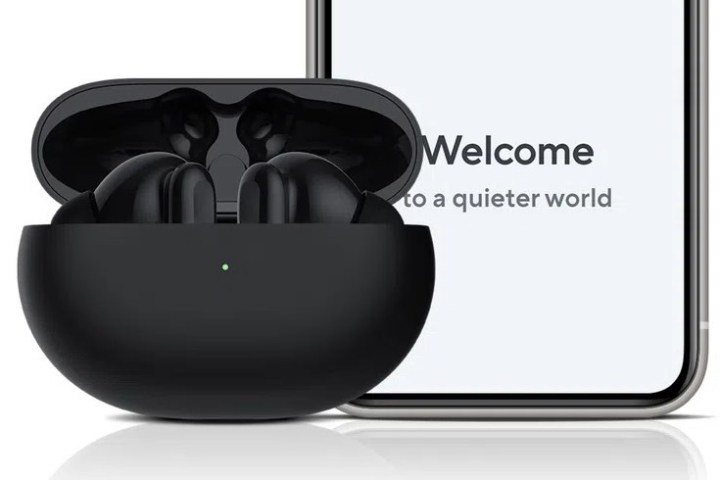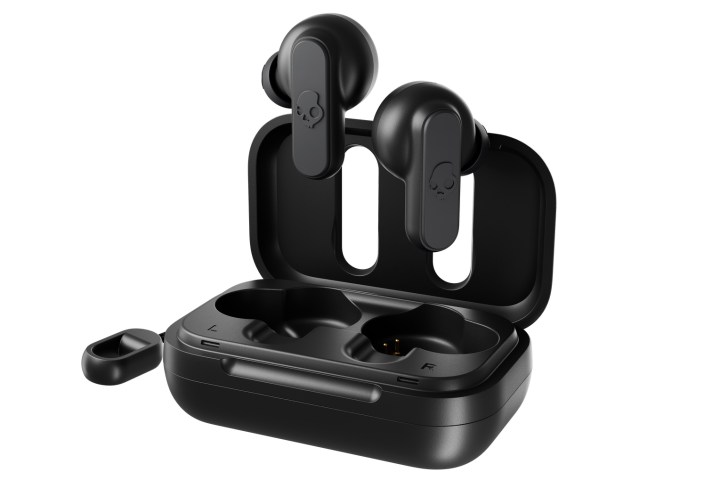Whether they’re a gift for someone else, or just for you, these are some of the most affordable, high-quality true wireless earbuds you can get right now — and holiday sales could make them an even better buy. You may not recognize some of these brands, but we’ve tried them all, and they’re absolutely worth your money.
Wyze Buds Pro

Pros: Tons of features and excellent sound quality for the price
Cons: No EQ adjustment
What would you normally expect to pay for a set of true wireless earbuds with active noise cancellation (ANC), transparency mode, IPX4 water resistance, wear sensors, wireless charging, and great sound? $150? $200? More? Those would all be perfectly reasonable guesses, which is what makes the Wyze Buds Pro so remarkable. They have all of these features — and more — yet they cost less than $75.
We often like to throw around the term “AirPods Pro killer” for a set of earbuds that offer the same features as Apple’s best true wireless earbuds, but in the case of the Wyze Buds Pro, it’s not hyperbole — they really are fantastic. Even Apple’s signature feature — the ability to summon Siri using just your voice — can be replicated through the Buds Pro’s Alexa compatibility. Anything Siri can do, Alexa can (with a few exceptions) do, too.
The touch controls can be fully customized, with your choice of actions for single, double, and triple taps, covering playback, volume, and track skipping.
There are no presets or custom settings for EQ but I’d argue they sound great right out of the box — very clear, and with a bass response that feels perfectly natural and balanced. Not too boomy, and not too light. But if you do want a bit more low-end, there’s an optional bass boost mode.
Soundpeats Air3

Pros: Just like AirPods, but at a fraction of the cost
Cons: Shorter battery life than most true wireless earbuds
If you like the Apple’s AirPods design, with their elongated stems and open-fit earbuds, but you’re not wild about their price, the Soundpeats Air 3 are an ideal alternative. They’re ultra-compact, with a charging case that’s even smaller than Apple’s, and they sound surprisingly good once you get them adjusted in your ears correctly.
A set of wear sensors can automatically pause and resume your tunes when you remove or reinsert an earbud, and the touch controls give you access to every function you need. They can also handle more exposure to water than Apple’s buds, with an IPX5 rating, and gamers will appreciate the optional low-latency mode so that ensures on-screen action is never out of sync with the sound.
A single charge will get you five hours of playing time, which is similar to the AirPods, but the 17-hour total time is considerably shorter (24 hours for AirPods).
Urbanista Lisbon

Pros: Lots of color choices, tiny size
Cons: A bit tricky to find the right position for the best sound
Want something even smaller than the Soundpeats Air 3? Urbanista’s Lisbon might just be the smallest earbuds in the world — it’s like someone took a set of AirPods and then sliced the golf tee stems right off. That size also makes them incredibly comfortable.
Their charging case is equally diminutive, making for a package that is super-pocketable. They sound really good, but as with the Soundpeats Air 3, you may have to wiggle them around in your ears to get the best results.
You won’t find any special features here. There’s no ANC, transparency, wear sensors, adjustable controls or EQ, and no wireless charging. Instead, you get simplicity, a choice of five colors, and really decent battery life: Nine hours per charge and 27 hours total playing time when you include the charging case. Who says earbuds have to be boring?
Back Bay Tempo 30

Pros: Great sound, comfortable fit, long battery life, waterproof metal case, multiple colors
Cons: Touch controls can be finicky
You have never heard of Boston’s Back Bay Audio, but they make great products at ultracompetitive prices. The Tempo 30 are a perfect example. At just $45, they’re within reach of almost everyone’s budget, and yet they perform just as well as earbuds costing two to three times that price.
Their sound is rich and full, and if you love bass, the optional extra bass mode delivers even more low-end, though for me, the regular setting was plenty powerful. They come with a generous selection of six sizes of silicone eartips — twice as many as most earbuds, which should help even hard-to-fit ears find a comfy solution.
Battery life is excellent at eight hours per charge, and their tiny metal charging case holds another 24 hours, giving you well over a full day’s use before you need to plug back in.
There’s no ANC and no wireless charging, but at this price, that’s hardly unusual. The only thing missing is transparency mode, which given the Tempo 30’s ability to withstand lots of water (IPX7), would be nice to have when you’re out on a run.
Yamaha TW-E3B

Pros: Beautiful sound, compact size, multiple colors
Cons: Call quality, buttons are hard to press
The most expensive earbuds on this list (which, at their regular price of $100, is still relatively tame) do one thing really well — better than some earbuds that cost twice as much: They sound fantastic. The sound signature is well-balanced, with just the right amount of low-end bass to add weight and warmth, while the mids and highs remain clear and detailed.
Stereo imaging is particularly impressive — the E3B have a soundstage that is both wide and precise, letting you feel a level of immersion that is usually the domain of earbuds in the $200 to $300 range.
Of course, you can’t have it all. The E3B are low on additional features — no EQ or control adjustments, no ANC, no transparency mode, and no wireless charging. Battery life is decent (six hours per charge, 24 hours total playing time) but call quality is not so hot — even the slightest breeze will be heard by your callers. I also found the physical buttons were a bit hard to press at times.
But for those who crave the best sound for the smallest possible investment, it’s hard to beat the TW-E3B.
Nothing Ear 1

Pros: Affordable, unique, and packed with features
Cons: Some may find the sound lacks low-end punch
Just like the Wyze Buds Pro above, the Ear 1 — the first product from Carl Pei’s Nothing brand — attempts to offer all of the features of Apple’s AirPods Pro, but at fraction of the price. And like the Wyze Buds Pro, the Ear 1 mostly succeed. They’re tiny, and the transparent plastic of both the charging case and the earbud stems makes for a design statement that is truly unique. No one will mistake these for Apple’s buds.
As for features, you get it all: ANC, transparency mode, wireless charging, customizable EQ and controls, and in-ear detection. Battery life is almost on par with the AirPods Pro: 4.5 hours per charge with ANC on and 5.7 hours when it’s off. When ANC isn’t in use, you’ll get up to 34 hours total listening time.
Sound quality is very good, but our reviewer noted that some listeners may find the Ear 1 lacking in bass response and presence. However they also point out that “the flat, natural EQ makes a lot of the music I listen to sound the way I think it should.”
Read our in-depth Nothing Ear 1 review.
Skullcandy Dime

Pros: Crazy low price, tiny size, multiple colors
Cons: Very short battery life
It doesn’t get any more pocketable than the Skullcandy Dime, a set of earbuds that take up less room in your purse or pocket than an average remote key fob. But despite their tiny size and tiny price, these earbuds actually sound surprisingly good. There’s plenty of clarity and detail, and the bass response, while not massive, is more than enough to let you enjoy all kinds of music genres. Their IPX4 rating means they’ll have no trouble with workouts or rain, and they’re so light, you might not even know you’re wearing them. Otherwise, it’s a total no-frills experience — even their battery life requires some allowances at just 3.5 hours per charge.
They’re the ideal gift for someone who tends to lose things because Skullcandy sells replacement Dime earbuds individually, though current Covid-related shortages may limit their availability. The only thing to be aware of is that folks with deeper ear canals may have trouble getting a secure fit, as the small stems on the Dimes prevent you from pushing the earbuds deeply into your ears.
Read our Skulllcandy Dime hands-on review.
JLab Go Air Pop

Pros: Even crazier low price, great battery life, built-in charging cable, two-year warranty, multiple colors
Cons: Sound isn’t always super-clear
What’s cheaper than the Skullcandy Dime? The JLab Go Air Pop. At just $20, I’m not even sure how JLab can afford to produce these earbuds, let alone make a profit, but clearly the math works, and so do the Go Air Pop. Like the Dimes, it’s a no-frills experience, but what you do get is easily worth the price of admission: Perfectly adequate (if not fantastic) sound quality, good call quality, IPX4 water resistance, superb battery life (eight hours per charge and 32 hours total), and a very small, easily pocketable charging case.
That case even comes with a built-in USB charging cable — a design we’ve only ever seen on JLab products — that is ideal for forgetful people who sometimes leave home without one. Just treat it carefully. If it breaks, you’ll have to buy a new case.
Curious whether you should get the Dimes or the Go Air Pops? Check out our full Skullcandy Dime vs. Jlab Go Air Pop comparison.



